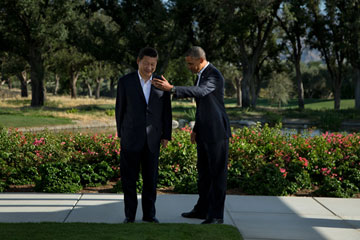
President Barack Obama, right, welcomes Chinese President Xi Jinping at the Annenberg Retreat at Sunnylands, Friday, June 7, 2013, in Rancho Mirage, Calif.
He was supposed to be on the island paradise of Bali, rubbing elbows with Asian heads of state and showing China that America is serious about being a Pacific power. Instead, on Oct. 8, Barack Obama was in the White House's cramped briefing room, embarrassed and apologetic. Managing the shutdown of the U.S. government had forced Obama to scratch his long-planned trip to a pair of Asian summits that he'd been touting as critical venues for a display of renewed American leadership in the region. Now he was telling reporters at a White House press conference that his grounding was a setback for the country. "It creates a sense of concern on the part of other leaders," Obama said. "It's almost like me not showing up for my own party."
Happy to console the disappointed heads of state in Bali was China's President, Xi Jinping, who was the unchallenged heavyweight among the gathered Asian leaders. Xi, gloated the Hong Kong--based Communist Party newspaper Ta Kung Pao, "has become the brightest political star on the Asian diplomatic platform. In contrast, America has lost an important chance to perform ... The influence of the U.S. is questioned more and more."
A potshot, perhaps. But Obama's no-show fueled doubts about whether America has the will and the resources to meet the challenge of a rising and potentially aggressive China. Obama officials have even given the policy for doing so a name--the "rebalance" to Asia, or as insiders call it, the Asia "pivot," conveying a crisp turn of direction for U.S. foreign policy.
Pivoting has been easier to say than do, however. Problems like Egypt, Syria, al-Qaeda and Iran have kept Obama mired in the sands of the Middle East at a time when his team hoped to be leading the way to a new era of Pacific engagement. Obama's planned six-day trip to the region was a chance to convince doubters with one of Obama's most valuable commodities: face time. In the end, though, his aides concluded that the President simply couldn't afford to be 10,000 miles from Washington at events like the Asia-Pacific Economic Cooperation (APEC) summit while the Tea Party had the U.S. government on lockdown. Once again, Asia would have to wait.
Panda Power
Obama didn't talk much about China when he first ran for President in 2008. When he did, he often raised simplistic alarms about Washington's borrowing from Beijing to finance the nation's deficit. But early in his first term, his national-security advisers concluded that the wars in Iraq and Afghanistan and the global hunt for terrorists had distracted the U.S. from East Asia--and that China was quickly filling the vacuum. Having largely weathered the global recession and continued its rapid growth, China was codifying economic practices opposed by the West--and which the U.S. says give China an unfair advantage--like investments by state-owned enterprises that ignore human rights and environmental factors. More ominously, Beijing was making ever more assertive territorial claims in the crowded waters around its borders and intimidating its smaller neighbors.
